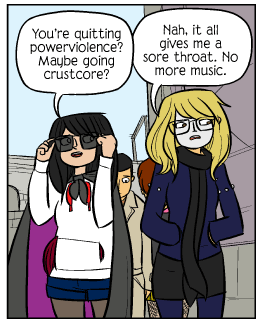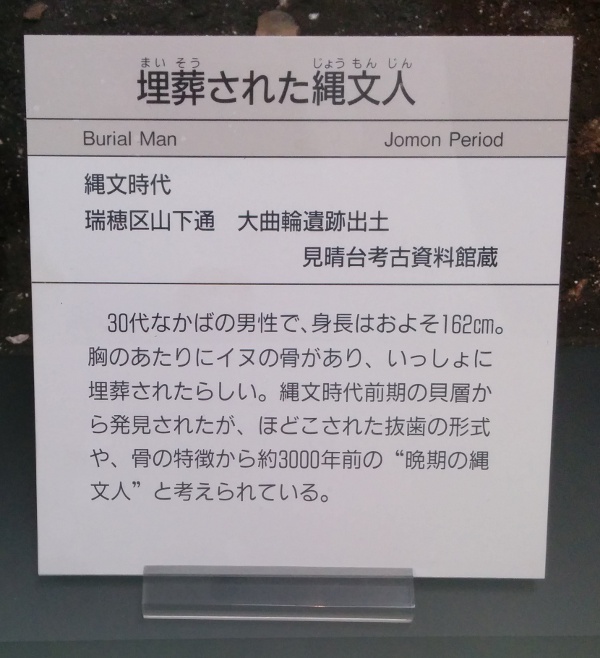Stray Chinese characters in English language documents
Lawrence Evalyn wrote to me saying that he received the official communication below about a new student card that is being issued by his university. He was perplexed by all the Chinese characters that got inserted in the text. They seem to appear consistently in certain places and for certain letters. [N.B.: The communication has been anonymized for posting on Language Log.]
Read the rest of this entry »
Genres
 In today's Bad Machinery, Shauna abandons powerviolence and decides against crustcore.
In today's Bad Machinery, Shauna abandons powerviolence and decides against crustcore.
Some of you will recognize that these are names of musical genres, well enough established to have Wikipedia entries. Thus
Powerviolence […], is a raw and dissonant subgenre of hardcore punk.The style is closely related to thrashcore and grindcore.
and
Crust punk (often simply crust) is a form of music influenced by anarcho-punk, hardcore punk and extreme metal.
Read the rest of this entry »
Chinese characters formed from letters of the alphabet
Tim Cousins sent in this photograph of a sign in a local mall in Dalian, northeast China.
Read the rest of this entry »
Geoffrey Leech, 1936-2014
Geoffrey Leech, one of the giants of corpus-based computational linguistics, passed away yesterday. With the death of Chuck Fillmore in February, the field has lost two of its pillars this year.
Read the rest of this entry »
Lorem China
Brian Krebs, "Lorem Ipsum: Of Good & Evil, Google & China", Krebs on Security 8/14/2014:
Imagine discovering a secret language spoken only online by a knowledgeable and learned few. Over a period of weeks, as you begin to tease out the meaning of this curious tongue and ponder its purpose, the language appears to shift in subtle but fantastic ways, remaking itself daily before your eyes. And just when you are poised to share your findings with the rest of the world, the entire thing vanishes.
Read the rest of this entry »
Cantonese and Mandarin interwoven
Tom Mazanec noticed this ad for China Mobile by the baggage claim at the Guangzhou (Canton) Baiyun Airport a few nights ago:
Read the rest of this entry »
ER and ERM in the spoken BNC
From John Coleman:
Inspired by your recent Language Log pieces, I tried an analysis of "er" vs "erm" in the Spoken BNC. These are the two main transcriptions for filled pauses labelled as "UNC" in the Claws-5 tagset and also "UNC" in the richer set of pos labels used in BNC. I.e. they are distinguished from items labelled as ITJ / INTERJ, in which the few tokens of "uh" and "um" are classified. These "uh"s are almost all in "uh huh" meaning "yes", and many of the "um"s and "mm"s are also in contexts where the "yes" sense is clear. So I disregarded the ITJs and restricted the analysis to UNC "er" and "erm", which are far more numerous in any case. As these are mostly nonrhotic dialects one can interpret "erm" as just schwa + nasality, with no implication of rhoticity; ditto for "er".
Read the rest of this entry »
Biscriptal juxtaposition in Chinese
We have often seen how the Roman alphabet is creeping into Chinese writing, both for expressing English words and morphemes that have been borrowed into Chinese, but also increasingly for writing Mandarin and other varieties of Chinese in Pinyin (spelling). Here are just a few earlier Language Log posts dealing with this phenomenon:
"A New Morpheme in Mandarin" (4/26/11)
"Zhao C: a Man Who Lost His Name" (2/27/09)
"Creeping Romanization in Chinese" (8/30/12)
Now an even more intricate application of alphabetic usage is developing in internet writing, namely, the juxtaposition and intertwining of simultaneous phrases with contrasting meaning. Here are a couple of examples:
Read the rest of this entry »
Filled pauses in Glasgow
In previous posts about filled pauses, we've seen a consistent and large sex difference: women use (what's transcribed as) "um" somewhat more than men do, and men use (what's transcribed as) "uh" a lot more than women do. This pattern has been found in two large conversational telephone speech corpora involving a mix of ages and American regions, in a collection of undergraduate speed-dating transcripts, in a collection of undergraduate "tell me about your weekend" interviews, and in a collection of several hundred sociolinguistic interviews collected over a period of four decades in Philadelphia.
There are apparently also effects of age, of region, of time period, of years of education, of Autism diagnosis, and so on. Today I'll add one more geographical data point — young adults from the Glasgow area — and one more variable — friends vs. strangers.
Read the rest of this entry »
Reading the Quran
The following photograph appears in this BBC article: "Why is Sanskrit so controversial?"
It is accompanied by this caption: "Muslims in India choose to learn Arabic".
Read the rest of this entry »
Japanese English trifecta: At the ¥100 Shop
Nathan Hopson reports that he "had a delightfully giggly trip to the ¥100 Shop today."
Among the gems were these three:
1. Pair Bloom (broom), a mini-broom and dustpan set
2. Crash Cashew Nuts (crushed)
3. Q-ban, my favorite. This was actually a whole product line. The shared distinguishing feature of all is their suction cup (吸盤 or きゅうばん [ kyūban]). I guess the only surprise is that they're not called Cubans.
Read the rest of this entry »
Permalink Comments off




